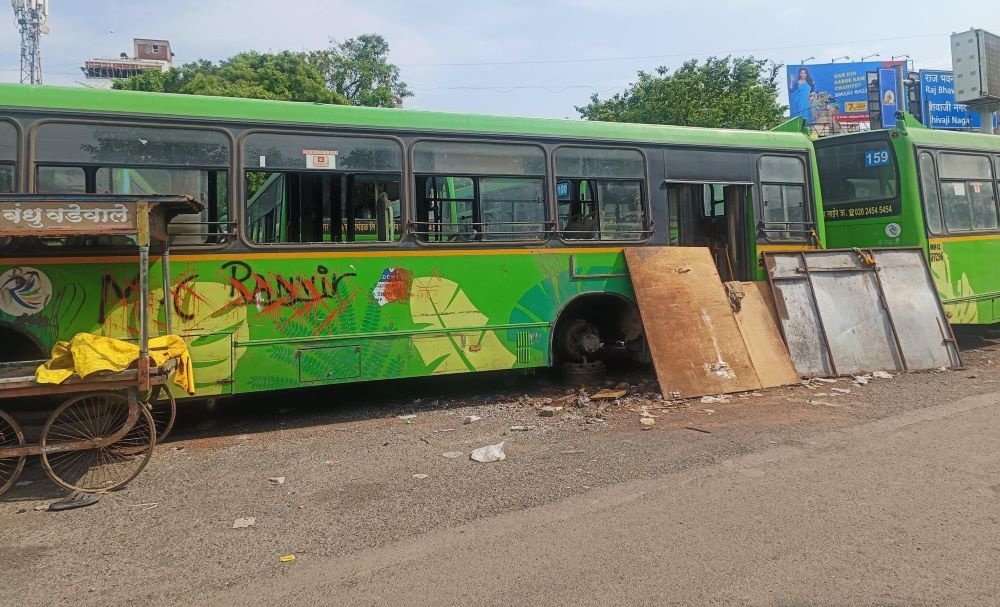Neglected PMPML Buses Highlight Public Transportation Woes in Pune

Pune Pulse Impact: Meeting Held With PMPML To Discuss Fate Of 70 Defunct Buses Lying In Aundh Bus Depot
Pune boasts a commendable bus service operated by the Pune Mahanagar Parivahan Mahamandal Limited (PMPML), its reach and reliability leave much to be desired for commuters.
12 June 2024
On top of being a student’s hub, Pune poses as an extremely attractive destination for IT companies and employees. The city pulsates with a zestful modernity while retaining its rustic charm.
However, one major drawback of the city itself is the lack of public transport. Due to inadequate metro connectivity, a major load of providing public transportation falls on the PMPML. Recently, an acute shortage in availability of buses for daily commuters, among other reasons, has garnered grievances from residents in different parts of the city.
Vinita Deshmukh, a senior journalist and an RTI activist, took to social media platform ‘X’ to raise questions and concerns regarding the tattered conditions of quite a handful of buses parked in what used to be known as ‘Aundh Jakat Naka’.
Highlighting the issue, she shared visuals of the buses in question and wrote, “These PMPML buses are parked here at what was once the Aundh jakat naka; since the last 4 yrs say the few people who have chawls here. 60-70 relatively brand new buses with wheels stolen are rotting here.
@PMCPune
@PMPMLPune
“what the hell are you doing sleeping over this? #Pune”.
The post gathered similar outcries from other users. Expressing his anger one user wrote, “I call it #PMPML crematory
They could’ve been donated to other needy cities if
@PMPMLPune
didn’t want to use them.
This is sheer wastage of public funds and places”.
Another one wrote, “Shocking ! Waste of taxpayers money !! I think we should stop paying tax now if such negligence by officers.. penalty should impose on them!”
For the denizens of Pune, the daily commute is often fraught with frustration and inconvenience. With an expanding urban sprawl and increasing traffic congestion, the reliance on personal vehicles exacerbates the city’s environmental woes while also contributing to the harrowing experience of navigating its congested streets. The absence of an efficient and extensive public transportation network only exacerbates these woes, leaving citizens grappling with the twin burdens of time and expense.
“In a city where transport is scarce, passing by these buses parked there in tattered conditions; tires stolen, windows broken is so outrageous… we need to know if these buses can be repaired and made functional,” Vinita Deshmukh told Pune Pulse.
However, PMPML’s CEO Sanjay Kolte clarified the issue and informed that the buses parked in that particular area of Aundh are there due to a legal falling out with the private operator and will soon be liquidated; delving into the details he stated, “We had an agreement with MP enterprises and associates limited, but he did not uphold to the terms and conditions we agreed upon and therefore we terminated that contract. The buses that are parked there will soon be liquidated by the court.”
Further, he added that new buses will be put into use soon by the PMPML, saying, “500 CNG buses and 177 E-buses will come in soon. We are trying to make up for the shortfall of the buses.”
Jugal Rathi, president of the Pravasi Manch, corroborated Kolte’s clarification but at the same time emphasised on maintaining the quality of the PMPML buses, especially the ones that are run by private operators; he remarked, “Certain amenities are mandatory for buses to have, like to maintain their quality, like destination boards etc., and private operators should be held accountable for not upholding these standards. The contract has to be proper and it should be monitored. The private operator buses are viable only if terms and conditions are upheld.”
The establishment of public-private partnerships and community engagement programs can be crucial in mitigating the disparity between supply and demand, fostering innovation, and augmenting the general efficacy and accessibility of public transportation facilities so long as the public authorities do not become lackadaisical in their approach to hold private operators responsible for their faults.









